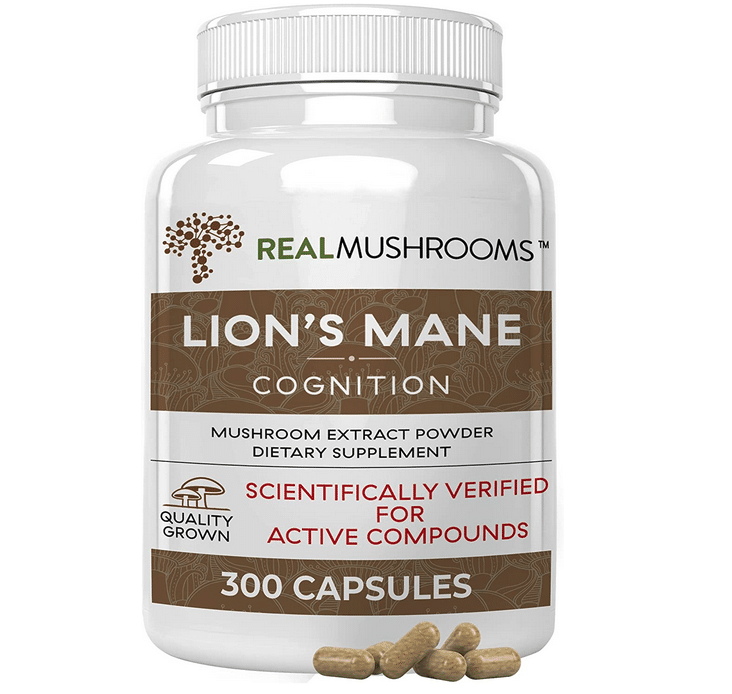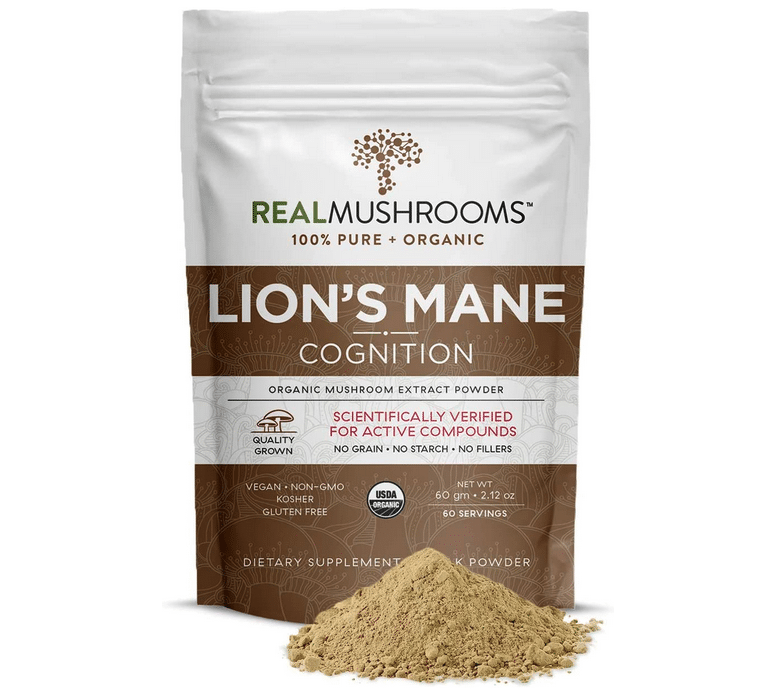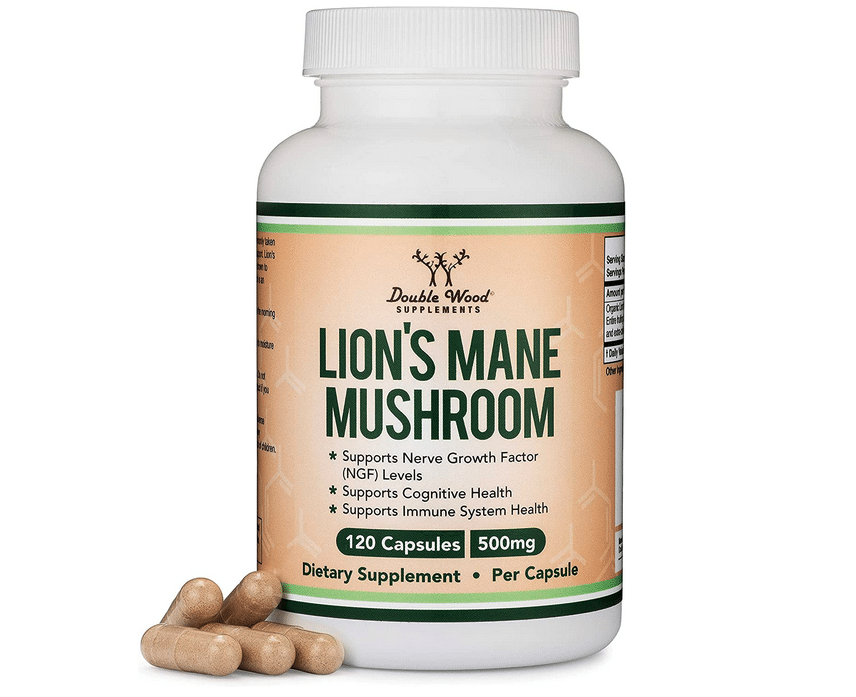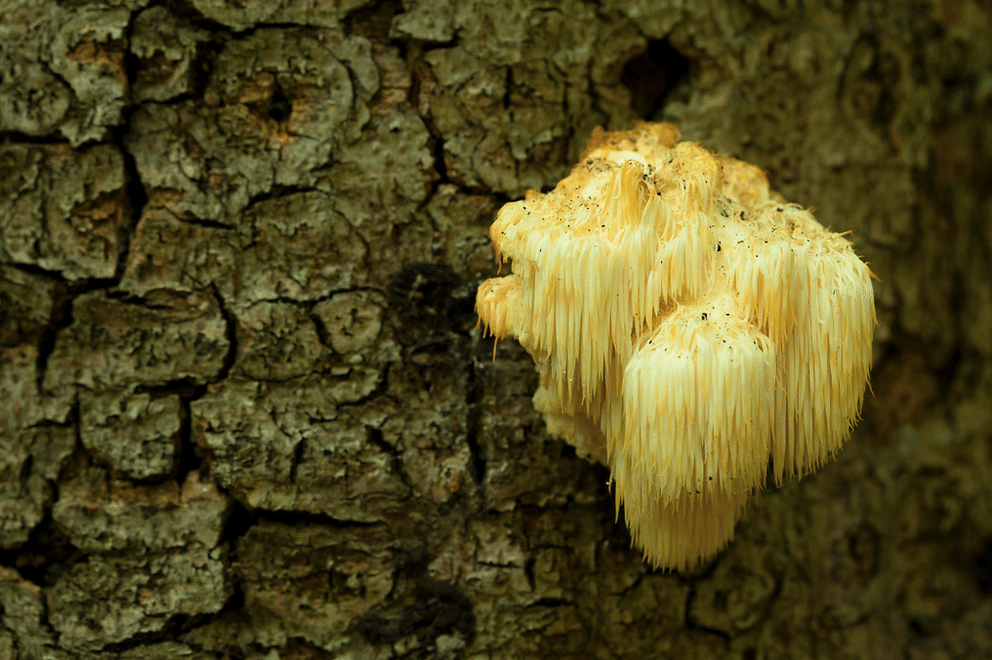
Our Recommendations For Best Lion’s Mane—At A Glance

Editors’ pick
Real Mushrooms Lion’s Mane Cognition Capsules
No grain fillers, from a company that does only adaptogenic mushroom products. Lab-tested and verified, and at a great price.

Editors pick – for smoothies or morning coffee
Real Mushrooms Lion’s Mane Cognition Powder
These mushrooms are hand-picked and organic, as well as lab tested and verified.

Also great
Double Wood Lion’s Mane Capsules
Well-sourced lion’s mane at a great price, from a trusted brand in the industry.
Lion’s mane, also known as yamabushitake, is an edible mushroom that shows promise as a cognitive enhancer, mood booster, and immunomodulator. This is due to its active ingredients including beta-glucans and antioxidants.
Lion’s mane was traditionally used as a tea, but is now widely available in capsules. Consumers describe the taste of lion’s mane tea as similar to crab or lobster, though this has since been disguised in coffee, flavored teas and capsules.
In this article we’ll explain where to buy lion’s mane mushroom, the best lion’s mane supplements, and why you should be interested in lion’s mane.
Lion’s Mane May Help With Anxiety And Depression
One of lion’s mane’s key active compounds, beta-glucans, has several types of biological activity ー each of which is beneficial in various ways. In addition to these effects, lion’s mane can also improve several aspects of mental health. For example, a study found that after taking lion’s mane for 4 weeks, subjects had reduced depression and anxiety symptoms.
This randomized, controlled trial, published in Biomedical Research International—a quarterly peer-reviewed medical journal covering research on biomedical sciences and experimental medicine—found a reduction in complaints about depression and sleep quality after just 4 weeks using Lion’s Mane. We have extensively cataloged and researched how improving sleep quality and fighting depression can also help with anxiety.
Not convinced? More peer reviewed research on the benefits of lion’s mane for anxiety include:
- A literature review in Behavioral Neurology says lion’s mane “can [produce] improvements in… depression,” adding that of the many “medicinal” mushrooms on the market, “only [lion’s mane] has confirmed pharmacological actions in the central nervous system in rats.”
- A literature review in International Journal of Molecular Sciences claims that “based on the neurotrophic and neurogenic pathophysiology of depression, [lion’s mane’ may be a potential alternative medicine for the treatment of depression.”
- An experiment with mice published in Chinese Medicine showed that 4 weeks of [lion’s mane supplementation] ameliorated depressive-like behaviours in mice subjected to 14 days of restraint stress.”
More Lion’s Mane Benefits
One of lion’s mane’s key active compounds, beta-glucans, has several types of biological activity ー each of which is beneficial for a different bodily process. In addition to these effects, lion’s mane can also improve several mental health parameters. For example, a study found that after taking lion’s mane for 4 weeks, subjects had reduced depression and anxiety symptoms.
Beta-glucans are a class of neuroprotective compounds which clinicians believe can prevent cognitive decline. In rats induced with dementia, lion’s mane prevented impairments in short-term recognition. In patients with mild cognitive impairment, a placebo-controlled double-blind trial successfully demonstrated that lion’s mane can improve cognition – suggesting its promise for neurodegenerative disorders like dementia and Alzheimer’s.
To reverse cognitive impairment, redeveloping neural circuits in the brain is one potential mechanism. An in vitro study showed that NGF (nerve growth factor) ー a neurotrophic factor found in the brain that is boosted by lion’s mane ー enhances neurogenesis, further demonstrating lion’s mane potential role in treating cognitive disorders.
Different compounds in lion’s mane can suppress or enhance immune activity and inflammation. In one study, lion’s mane suppressed pro-inflammatory factors in vitro. In another, beta-glucans upregulated the innate immune response. It’s unclear yet what this means for immune function or what the best use case would be.
Boosting the immune system may have anti-cancer benefits though. In mice, a study found that lion’s mane inhibits cancer metastasis, specifically for colon cancer spreading to the lungs. However, there are different types of cancer and lion’s mane might interact with other drugs so for now these results only suggest lion’s mane’s future potential.
Human studies have used 2-3 grams of whole lion’s mane powder daily. The most common dose is 1000 mg 2-3 times a day, for 2-3 grams a day total. It’s still too early for the optimal dosage to be determined. The best way to take lion’s mane mushroom is generally in capsule form, for convenience.
The only side effects we are aware of is itchy skin which often occurs due to an increase in nerve growth factor that exacerbates atopic dermatitis during use. If this causes discomfort, you should stop taking lion’s mane. Sometimes you can also develop itchy skin if you’re allergic to lion’s mane mushrooms – if this happens, again stop using it right away.

Lion’s Mane Reviews

Best High Dose Lion’s Mane Capsules
Real Mushrooms Lion’s Mane Capsules
Real Mushrooms Lion’s Mane Capsules contain non-GMO, organic lion’s mane mushrooms whose fruiting bodies are hot water extracted for a pure, chemical-free product. Their capsules also don’t contain grain fillers – a common issue with other mushroom capsules – that are harder to digest and may even trigger grain-associated allergies.
If you’re looking for a higher dose, Real Mushrooms has the best lion’s mane supplement for you. Each serving provides 1 gram per 2 capsules – they recommend taking 2 capsules 2-3 times a day. This follows on from the dosage used in human clinical trials. Importantly, this product guarantees at least 25% beta-glucans for high potency as beta-glucans levels are measured by third-party testers.

Also great
Double Wood Lion’s Mane Capsules
Double Wood Lion’s Mane Capsules contain 500mg of whole fruiting body per capsule. Fruiting bodies are the reproductive structures of mushrooms and contain a higher amount of active ingredients, including beta-glucans. Double Wood sources their lion’s mane from California mushroom farms.
We recommend taking 2 capsules twice a day for 1 gram of lion’s mane a day. Even though this is half the dosage that clinical trials have used, users have noticed significant improvements in memory and cognition.

Best Lion’s Mane Mushroom Powder
Real Mushrooms Lion’s Mane Powder
Like the capsules, Real Mushrooms Lion’s Mane powder is dosed the same at 1 gram per ½ teaspoon. Again, Real Mushrooms promises that each serving has a potency of at least 25% beta-glucans. Their mushrooms are organic and hand-picked to make sure you are receiving the best fruiting bodies for consumption.
Traditionally, lion’s mane powder was brewed in a tea, but most people who have tried it say it tastes better mixed with coffee.
Read Our Review On The Best Chaga And Reishi Mushroom Supplements.
Editor’s note: we are regularly updating this review. If you see any problems, weird interpretations of the data, or just want to say hi, please reach out to hello@the-unwinder.com.